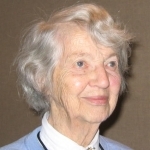 (HOST) Commentator Edith Hunter has been thinking about the poet Emily Dickinson – and how her words accompany the seasons throughout the year.
(HOST) Commentator Edith Hunter has been thinking about the poet Emily Dickinson – and how her words accompany the seasons throughout the year.
(HUNTER) I have been thinking of writing a letter to Emily Dickinson. I have to confess that I only understand about one quarter of her poems, but those that I do understand make an "internal difference where the meanings are."
I say that I understand only one quarter of her poems. I don’t say that I don’t get "what she is trying to say." Our very accessible contemporary poet, Billy Collins warns us in his poem, "The Effort":
"Would anyone care to join me
in flicking a few pebbles in the direction
of teachers who are fond of asking the question:
‘What is the poet trying to say?’
as if Thomas Hardy and Emily Dickinson
had struggled but ultimately failed in their efforts –
inarticulate wretches that they were,
biting their pens and staring out the window for a clue."
I’m grateful that I am able to go through the four seasons of the year, with snippets of Emily Dickinson’s poetry echoing in my mind. On the first of March I can say
"Dear March, come in!
How glad I am!
I looked for you before.
Put down your hat –
You must have walked –
How out of breath you are!"
And if I go to the one place in Weathersfield where I know I can find May flowers or trailing arbutus, I am reminded:
"Pink small, and punctual.
Aromatic, low,
Covert in April,
Candid in May,
Dear to the moss,
Known by the knoll,
Next to the robin
In every human soul."
And in mid-July, when the large field next to our house fills with tall grass which ripples in the wind, I like to remember:
"The grass so little has to do, –
A sphere of simple green,
With only butterflies to brood.
And bees to entertain
And stir all day to pretty tunes
The breezes fetch along,
And hold the sunshine in its lap
And bow to everything;"
As fall sets in, I am reminded that:
"The morns are meeker than they were,
The nuts are getting brown;
The berry’s cheek is plumper,
The rose is out of town.
The maple wears a gayer scarf,
The field a scarlet gown,
Lest I should be old-fashioned,
I’ll put a trinket on."
And finally:
"There’s a certain slant of light,
On winter afternoons,
That oppresses, like the weight
Of cathedral tunes.
Heavenly hurt it gives us;
We can find no scar,
But internal difference
Where the meanings are."
So, here’s my letter: Dear Emily Dickinson: Thank you so much.
Edith F. Hunter